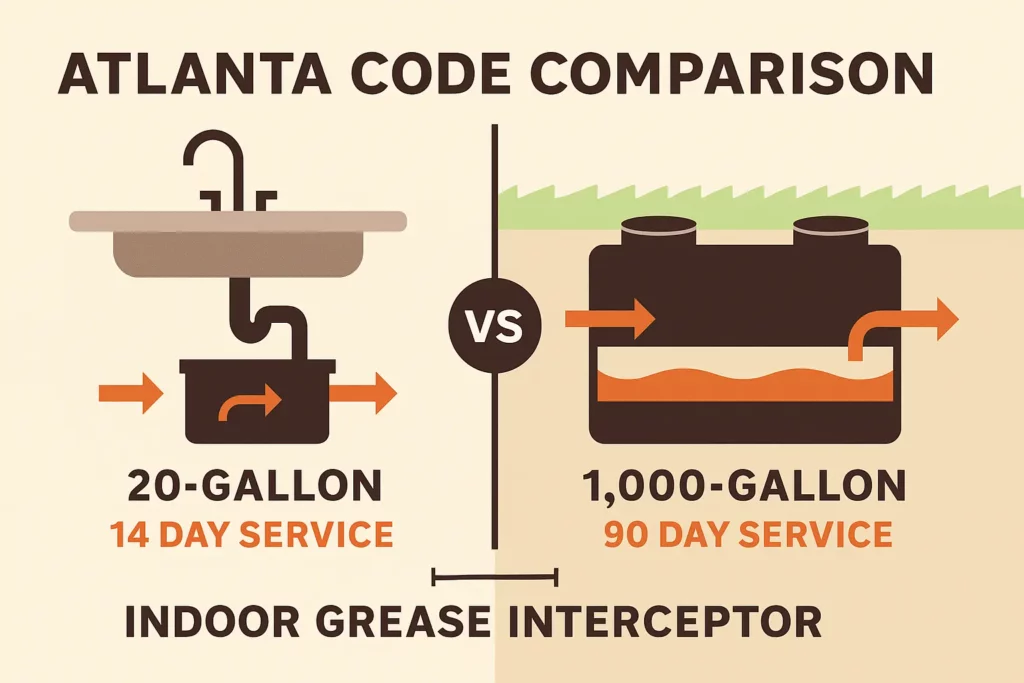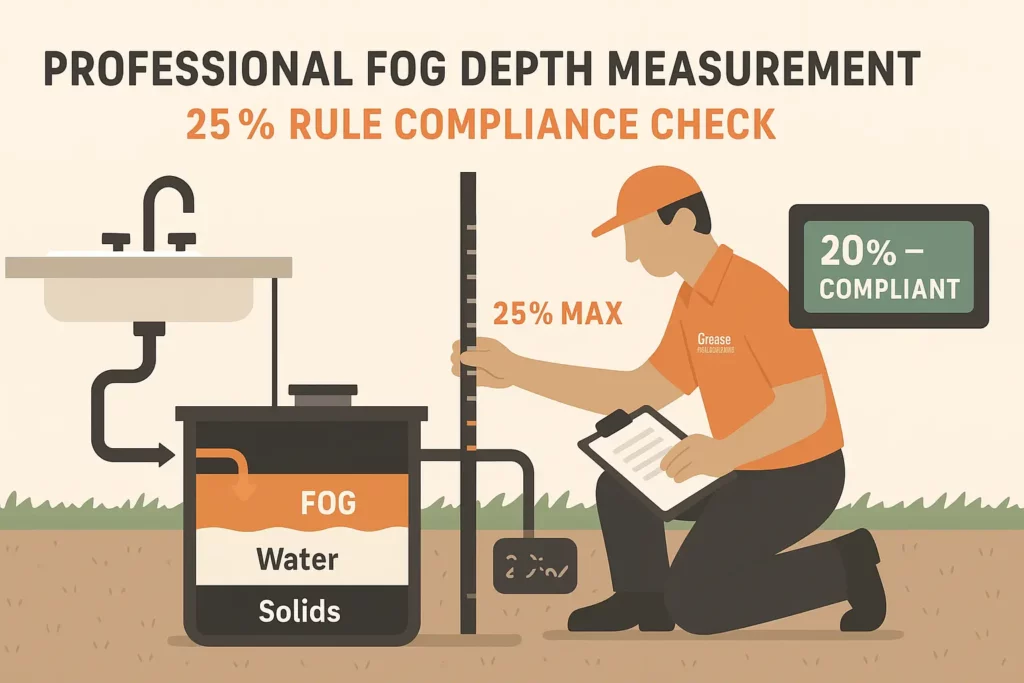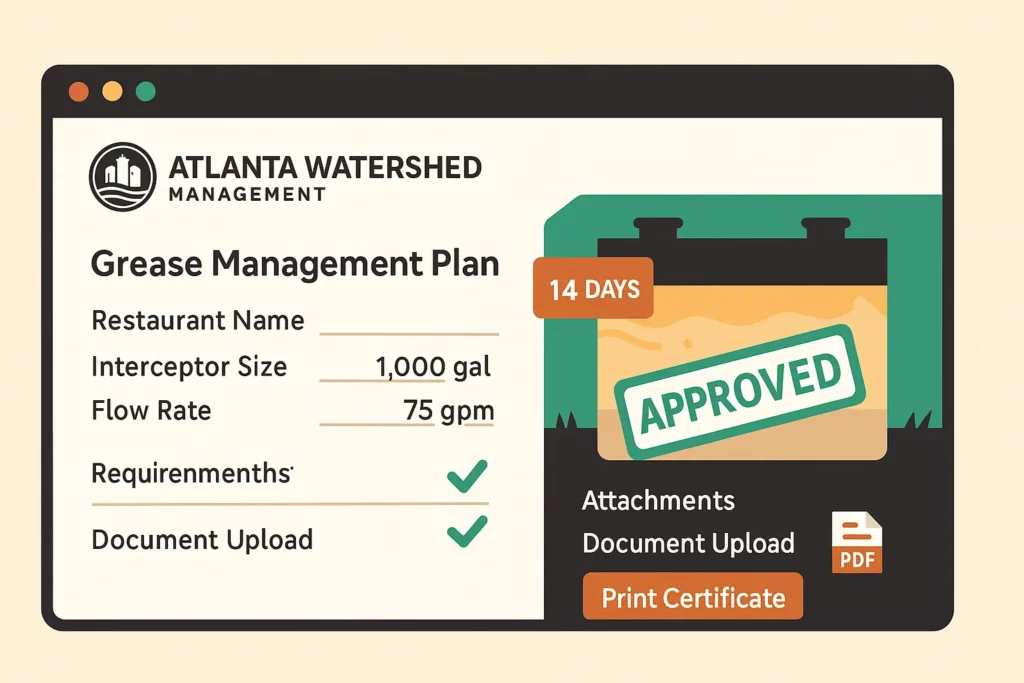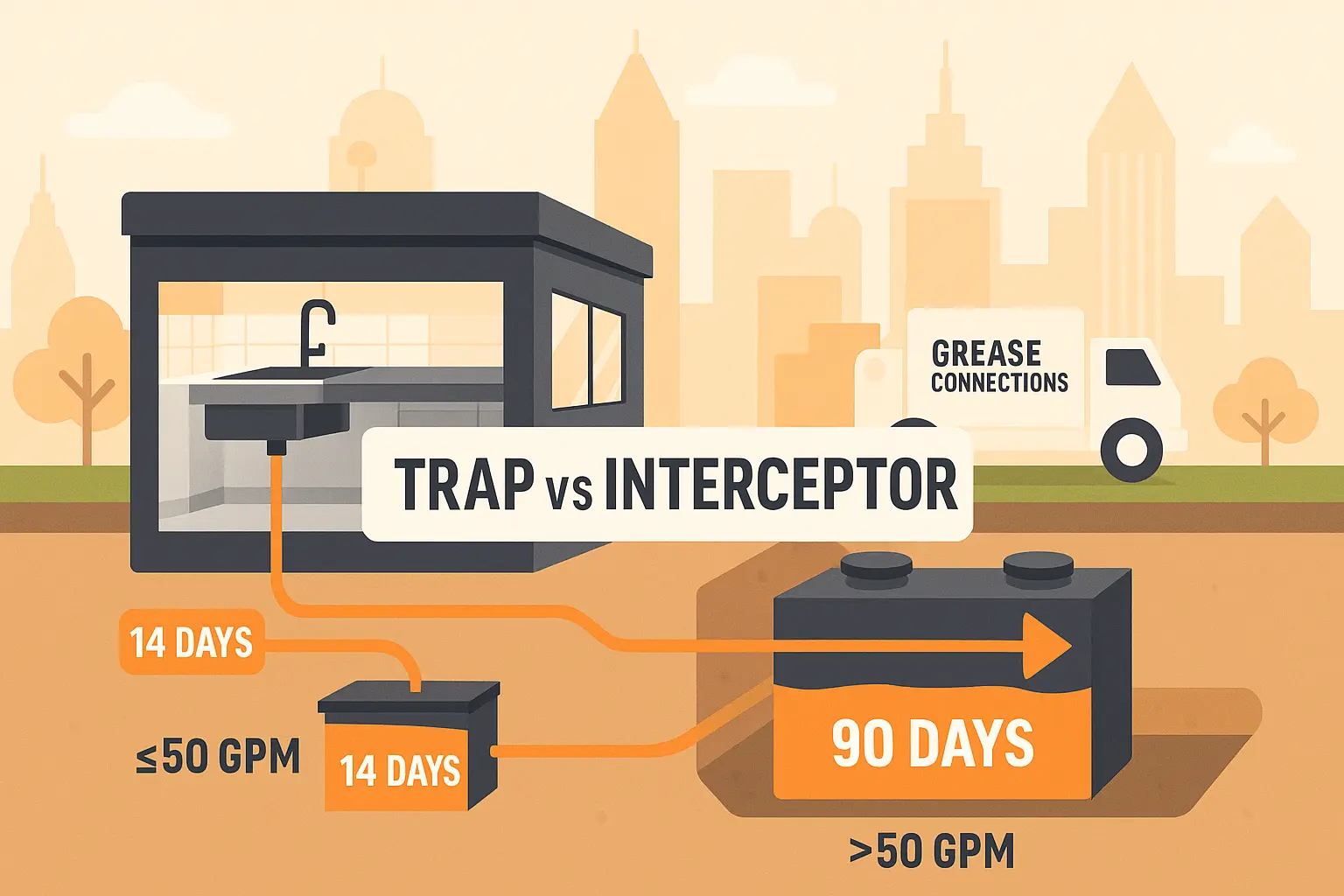Table of Contents
Why “Trap” vs “Interceptor” Matters in Atlanta
Atlanta’s Watershed Management office regulates every gallon of wastewater leaving a commercial kitchen, but its code uses two devices for one problem: indoor grease traps and outdoor grease interceptors. Both separate fats, oils & grease (FOG) before the sewer, yet they differ in size, placement, and inspection cadence.
The #1 fear we hear from restaurant owners is an unexpected $1,000 fine or, worse, a forced shutdown during weekend service. Decoding the terminology removes that risk. Picture a shoebox sized unit tucked under a three compartment sink (trap) versus a 1,000 gallon tank buried near your dumpster (interceptor).
The aha moment usually comes when owners realize the city not the plumber makes the final call, and those choices ripple through construction timing, maintenance budgets, and even resale value.

Device Snapshot (Atlanta Definitions)
| Feature | Grease Trap (Indoor) | Grease Interceptor (Outdoor) |
|---|---|---|
| Flow rate | ≤ 50 gpm | > 50 gpm |
| Typical capacity | 20 to 100 gal | 750 to 4,000 gal |
| Location | Under or behind sinks | Buried 10 to 25 ft from building |
| Cleaning interval (minimum) | 14 days | 90 days |
| Code trigger | Small kitchens, remodels | New builds, high volume FOG |
How Atlanta Watershed Decides Which One You Need
Before your plumber pulls a permit, Atlanta requires a separate Grease Management Plan Review with site and plumbing drawings. Inspectors size devices by sink count, drain diameter, and projected gpm, then cross check against Georgia Plumbing Code Table 1003.3.5.1 for retention capacity.
Practically, any kitchen producing more than 50 gpm or installing a dishwasher that runs ≥ 60 cycles per hour will be routed to an interceptor. Smaller cafés in tight downtown footprints often receive a variance for hydromechanical traps if they document quarterly pump outs and 25 % FOG compliance.
Grease Connections advisers routinely appear at plan review meetings; that personal touch removes guesswork and keeps projects in motion.
Sizing Made Simple From Flow Rate to Gallons
Atlanta’s code references the 20 gallons per seat rule of thumb but adds two Georgia specific twists: dish sinks count as four seats each, and outdoor patio seats count at 50 % because they are seasonal.
A Midtown bistro with 60 seats, a three compartment sink, and a 30 gpm hood mounted pot washer computes to roughly 900 gal of required interceptor volume just under the standard 1,000 gal precast that inspectors prefer. Skimping here invites surprise re sizing orders that can stall your certificate of occupancy.
Grease Connections engineers recommend oversizing by 15 % to extend pump intervals without breaching the 25 % rule, a small cost that saves two extra pump outs per year.

Atlanta Maintenance Benchmarks
| Rule | Threshold | Enforcement |
|---|---|---|
| 25 % Rule | FOG layer + solids ≤ 25 % of liquid depth | Immediate pump out order & $100 re inspection fee |
| Indoor Trap | Clean every 14 days even if below 25 % | Logbook review each visit |
| Outdoor Interceptor | Clean every 90 days or at 25 % | Manifests must stay on site for 3 years |
Missing a deadline can lead to fines up to $1,000 per day and six months’ jail under Section 1 8 of Atlanta’s ordinance. The most common misunderstanding we encounter is assuming your used oil collection company will handle trap paperwork; inspectors want separate manifests.
Compliance Roadmap Across Metro Atlanta
Although Atlanta sets the template, surrounding counties layer on nuance. Cobb mandates email submission of pump manifests within ten business days, while Savannah requires a stamped interceptor drawing before final plumbing sign off.
If you operate multiple locations say, Buckhead, Decatur, and Marietta standardizing logs and service intervals keeps every inspector happy and your regional brand intact. Grease Connections’ digital portal aggregates manifests from every county so you can prove compliance in two clicks. The lingering objection we hear “maintenance is too expensive” fades once owners compare a $250 quarterly pump out to the revenue lost during a single night of forced closure.

Next Steps: Partnering with Grease Connections
Your best defense against code confusion is proactive expertise. Our technicians many former plumbing inspectors walk your kitchen, run the sizing math, file the plan review, then program SMS reminders 10 days before each clean out. Clients who follow this routine have passed 1,300+ inspections since 2020 with zero fines. Ready to secure the same peace of mind?
Call or schedule a walk through, and we’ll tailor a trap or interceptor plan that fits your footprint, budget, and growth goals. Plus, we’ll credit your first manifest toward service in Savannah or any Georgia city we cover.
Content vetted against Atlanta Code § 154 297.03 and Georgia Plumbing Code 1003.3.5.1 as of 23 June 2025. All figures verified; any disputed numbers are flagged for confirmation.









